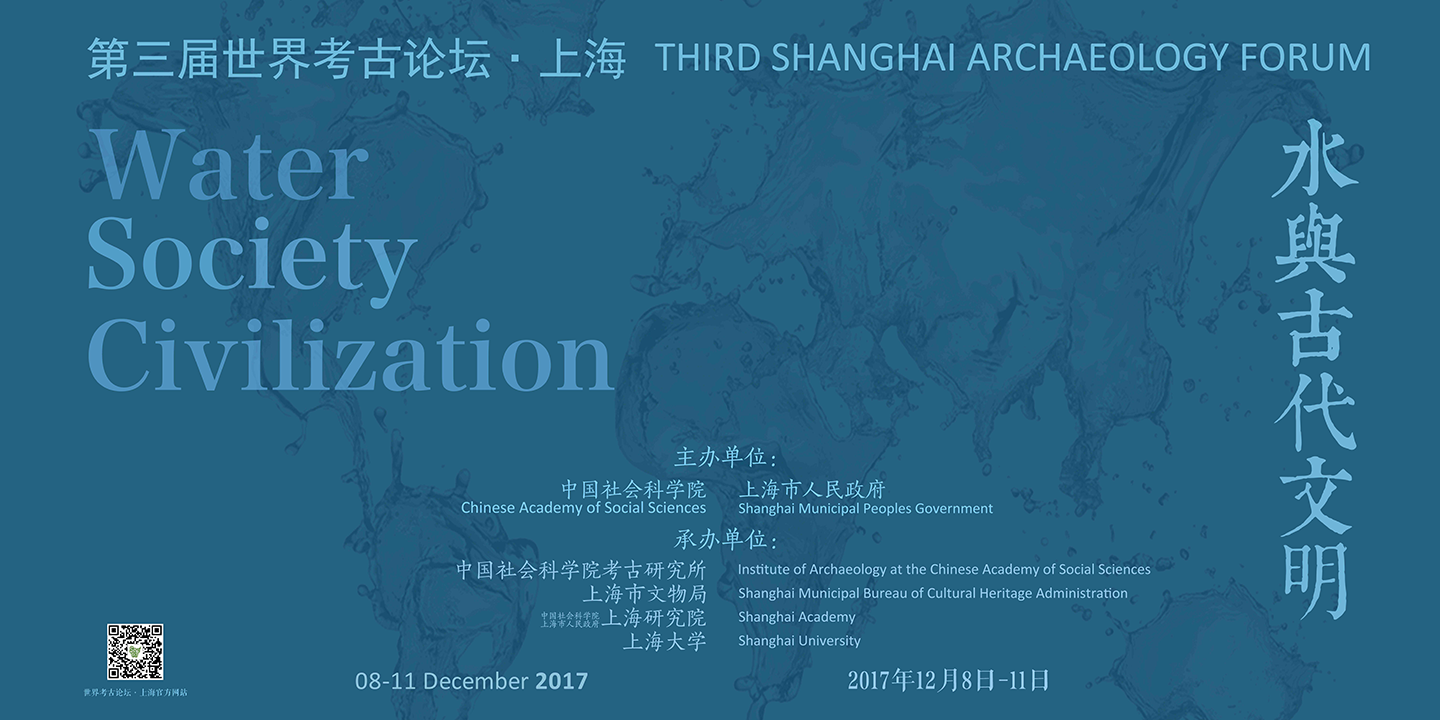 3RD SHANGHAI ARCHAEOLOGY FORUM
3RD SHANGHAI ARCHAEOLOGY FORUM
(8-11 DECEMBER 2017)
The 3rd Shanghai Archaeology Forum was held from the 8th through 11th of December 2017 in Shanghai, China, with a central theme of Water, Society and Civilization (see the opening ceremony).
第三届世界考古论坛于2017年12月8日至11日在中国上海举行 (开幕式)。
WATER, SOCIETY AND CIVILIZATION
From the inception of humankind, water has been essential to human existence and societal development. For millions of years, hunters and gatherers depended on wild animals and plants sustained solely by rainfall before agricultural societies began to develop around 10,000 years ago. The increasingly complicated relationship between water use and food production, social organization, and religious belief led to radical transformations of human societies and their structural dynamics, and witnessed the emergence of urban centers and civilizations all around the world. Water was crucial for the flourishing of all ancient civilizations, whether it was used for daily needs and activities, small or large-scale irrigation or flood protection, water transport, storage and drainage, or for ritual and religious purposes. As urban settlements expanded, the increasing demand for water stimulated a series of significant transformations to manage it, including the invention and widespread use of irrigation and drainage systems, collection and storage facilities, and long-distance water transport technologies. These transformations enabled greater food production that ultimately led to a sustained increase in population size and political complexity. In various places and times, water resources have been used in many ways, from the consumption of drinking water to the ritual use of water, from the construction of state-sponsored water infrastructures to the development of water technologies by local communities, and from the completion of China’s medieval age’s Grand Canal to the building of extraordinary aqueducts by Romans.
The extraordinary increase in the demand for water and the sustainability of water resources are among the most challenging global issues of our time. Urbanization, population growth, economic development, political conflicts, and human-induced climate change all contribute to ever-increasing pressure on the planet’s water resources. There is a pressing need to address current and future concerns over water for the fate of humanity. It has been widely recognized that the knowledge of both past and present engagements with water, waterscapes, and their infrastructures is essential to fully understanding the water problems being faced today and their potential solutions. Archaeologists have long recognized the importance of water and its management in the evolution of complex societies and ancient civilizations. Archaeological study of water, waterscapes, water management, sustainable agricultural strategies, and the ritual use and religious importance of water has grown tremendously in recent decades, particularly after Karl Wittfogel proposed his “Oriental Despotism” model of hydraulic civilizations in the 1950s. Archaeological engagement with water in the past may help address key aspects of water and water use in the present as well as the future, especially water scarcity, water-related disasters, and social practices developed by local communities. Such insights are not only limited to general principles or processes but are derived from contextualized local and specific cases and histories. As such, archaeological understanding of water issues past, present, and future is indeed challenging, but the reward is great.
水与人类的生存和发展息息相关。在进入农业社会之前的数百万年间,自然降水是狩猎采集社会仰赖的唯一水资源。水的使用与食物生产、社会组织、宗教信仰之间日渐复杂的关系,促进了人类社会及其组织机制的发展。无论是生活日常所需、灌溉、防洪、用水存储、排放和运输,还是礼仪与宗教,水对于古代文明的繁荣至关重要,包括世界各地城市和文明中心的出现。人类社会在临近河流与海岸的地方建造城市,通过掌控水资源来获取政治和经济利益。随着城市聚落的扩张,对水资源的需求日益增长,最终促进了一系列的技术革新,包括灌溉和排水系统、蓄水设施及长途运输技术的发明。这些技术革新提高了食物的产量,引发人口的持续增长,政治组织也变得更为复杂。从日常的饮用、洗浴到礼仪用水,从国家层次的大规模水利基础设施建设到地方水利技术的发展,从隋唐的大运河到古罗马的引水渠,地点不同,时代不同,文化不同,水资源的利用和管理方式也不尽相同。
急剧增长的水需求,以及水资源的可持续性,是当今世界面临的最大挑战。城市化、人口膨胀、经济发展、政治冲突和人为因素导致的气候变化等,加剧了地球上水资源的压力。当今以及未来用水的问题变得极为迫切。上世纪五十年代德国历史学家和汉学家魏復古提出关于水利文明的“东方专制”模式以来,考古学者愈加注重对水、水文景观、水资源管理、可持续性农业发展,以及水与宗教、礼仪关系的调查和研究。考古学对于水与人类社会发展的研究,有助于我们深入了解当今社会及未来水资源的一系列关键性问题,尤其是水资源缺乏、水灾害和地方治水的具体实践等。这些认识不只是一般原则或过程的阐述,更重要的是根植于特定历史场景和具体案例的分析。因此,对于水资源问题的考古学研究意义重大。
PROGRAM EVENTS
Plenary Session: Presentation of Awarded Projects
Plenary Session: World Archaeology Keynote Lecture Series
Special Session: Major Recent Archaeological Discoveries and Researches in China
中国考古新发现、新研究专场
Public Archaeology Keynote Lecture Series (Shanghai Museum, Shanghai University)
公众考古讲座(上海博物馆、上海大学)
Parallel Sessions: Water, Society, and Civilization
分会演讲与讨论

